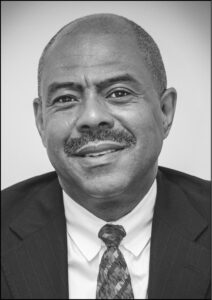This article originally appeared in The Bar Examiner print edition, September 2014 (Vol. 83, No. 3), pp. 2–3.
By Bryan R. Williams After serving eight eventful years as a member of the NCBE Board of Trustees, in August I was elected chair of the Board. It is indeed an honor to hold the position previously held by so many people that I respect and admire. Like many past chairs, prior to my time on the Board I had already served as a member of a state board of law examiners. Unlike most past chairs, however, while I serve as chair of this organization, I will continue to be an active member of the New York State Board of Law Examiners, where I am responsible for the actual writing and grading of the bar exam. I look forward to a rewarding year continuing to serve in both capacities.
After serving eight eventful years as a member of the NCBE Board of Trustees, in August I was elected chair of the Board. It is indeed an honor to hold the position previously held by so many people that I respect and admire. Like many past chairs, prior to my time on the Board I had already served as a member of a state board of law examiners. Unlike most past chairs, however, while I serve as chair of this organization, I will continue to be an active member of the New York State Board of Law Examiners, where I am responsible for the actual writing and grading of the bar exam. I look forward to a rewarding year continuing to serve in both capacities.
I am greatly privileged to succeed Margaret Fuller Corneille (known to us all as Peg) as chair of the Conference. The Conference is deeply grateful for Peg’s leadership. Under Peg’s direction the Conference has embarked on a strategic planning initiative that will help shape the vision of the Conference for years to come. Peg will be a tough act to follow, and on behalf of the Conference I want to congratulate and thank Peg for a great year.
While congratulating Peg on a great year, I am sad to say good-bye to Darryl Simpkins of New Jersey, who is leaving the Board. We thank Darryl for his hard work and dedication and wish him all the best. We also say good-bye to Franklin Harrison, who is leaving the Board after serving as Immediate Past Chair. Although Franklin is no longer on the Board, we will still benefit from his guidance as chair of the MBE Committee.
The landscape of bar examining is constantly changing. The growth of the Uniform Bar Examination, now adopted in 14 states, allows for greater score portability for law school graduates. Options for third-year law students to take the bar examination prior to graduation, such as those in New York and Arizona, offer the possibility of earlier admission to graduates. Pre- and post-admission requirements—such as the new pro bono service pre-admission requirement in New York and pre- and post-admission practical skills training requirements being considered in California—are being implemented in several jurisdictions. And it remains to be seen how the recent decline in law school enrollment will affect the bar admissions process.
I have been affiliated with the bar examination community since 1986. Over that time I have seen quite a change in the methods by which essay and multiple-choice questions are drafted and graded; a rise in the use of skills tests in bar examining; and a continuation of the quest to incorporate more real-life practice skills, legal research, and attorney civility into the bar exam—with the goals of ensuring that law students are practice-ready upon leaving law school, while at the same time ensuring the protection of the public.
Throughout these changes, NCBE continues to focus its attention on identifying issues and finding answers to questions that will keep us on the cutting edge of professional licensure testing. This year we hope to continue the momentum of previous years with the development of our strategic plan, ongoing education of academic support personnel about the bar examination, and exploration of potential changes geared toward improving our tests.
One of the strengths of NCBE lies in the work of its committees. As in the past, in order to accomplish our goals we will look to those committees—which are made up of current and former Board members, as well as bar examiners, administrators, and members of the judiciary—to do this important work. We have tried to make sure that as many jurisdictions as possible are represented on the committees. I have made a number of new appointments to the committees, and I look forward to working with these new members and hearing their ideas.
We look forward this year to continuing our commitment to education by offering a number of innovative programs—from programs designed to benefit new bar examiners and administrators, to grading workshops, and our Annual Bar Admissions Conference to be held in Chicago in April 2015.
We welcome the Honorable Phyllis D. Thompson of the District of Columbia and Gordon J. MacDonald of New Hampshire as our two newest Board members. Gordon has extensive experience as a long-standing member of the New Hampshire Board of Bar Examiners, which he currently chairs, and has most recently served on NCBE’s Multistate Essay Examination/Multistate Performance Test Committee. Judge Thompson, Associate Judge for the District of Columbia Court of Appeals, has been a member of NCBE’s Editorial Advisory Committee for a number of years.
Finally, our talented service-oriented staff in Madison will continue to support our committees and programs under the stellar leadership of NCBE President and CEO Erica Moeser.
This will be a busy and exciting year. I look forward to the journey.
Best regards to all.
Sincerely,

Bryan R. Williams
Contact us to request a pdf file of the original article as it appeared in the print edition.







